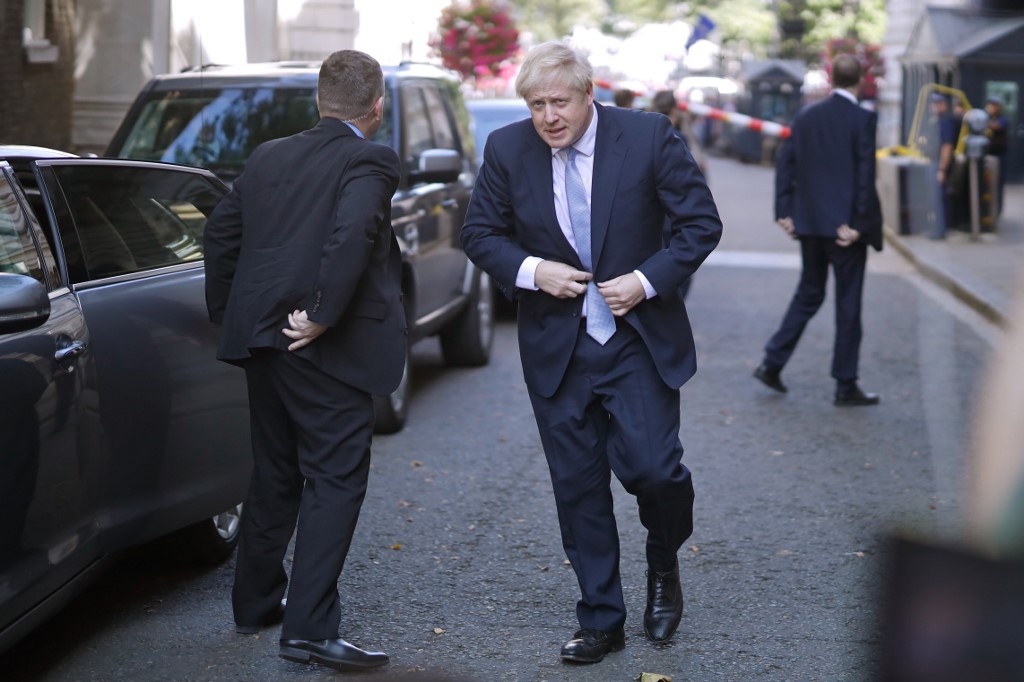New Prime Minister Boris Johnson named Brexit hardliners to top posts on Wednesday, replacing most of the cabinet after vowing to get a new divorce deal with the European Union or leave without one by October 31.

Britain's new Prime Minister Boris Johnson arrives to give a speech outside 10 Downing Street in London on July 24, 2019 on the day he was formally appointed British prime minister. (Photo: AFP)
The former London mayor has pledged to break the political deadlock that has left Britain in crisis and forced his predecessor Theresa May to delay Brexit twice.
But he faces opposition from within his own Conservative party and across parliament to his threat of a "no deal" exit, while EU leaders warn they will not renegotiate the divorce agreement they struck with May.
Within hours of taking office, Johnson signalled his new approach by replacing top ministers.
"We are going to fulfil the repeated promises of parliament to the people and come out of the EU on October 31, no ifs or buts," he declared outside Downing Street.
Watched on by his 31-year-old girlfriend Carrie Symonds, the 55-year-old leader said "the doubters, the doomsters, the gloomsters are going to get it wrong again".
But he added that Britain would "prepare for the remote possibility that Brussels refuses any further to negotiate and we are forced to come out with no-deal".
Shortly after, he named Dominic Raab as foreign minister.
Raab has said he would support a suspension of parliament in order to push through a no-deal Brexit if necessary.
Johnson also named Jacob Rees-Mogg, leader of an arch-Brexiteer faction of Conservatives, as leader of House of Commons, charged with guiding legislation through the chamber.
'Not the real world'
Johnson's supporters hail his wit and optimism, and say his unconventional approach can rescue Britain from its current limbo.
But he has only a wafer-thin working majority in parliament, and is a divisive figure among the wider public.
As a figurehead of the 2016 EU referendum, he was criticised for populist rhetoric and exaggerated claims.
Rivals now accuse him of having no real plan for Brexit, and of underestimating the implications of a disorderly divorce.
European Council president Donald Tusk was quick to congratulate Johnson, but added pointedly: "I look forward to meeting you to discuss -- in detail -- our cooperation."
Irish Prime Minister Leo Varadkar, whose country would be hardest hit by a "no deal" Brexit, was more blunt.
"Any suggestion that there can be a whole new deal and negotiated in weeks or months is totally not in the real world," he said.
Johnson has more support on the other side of the Atlantic.
US President Donald Trump was one of the first to congratulate Johnson on his victory saying he would be "great" and describing him as "Britain Trump".
The new Johnson government will be seeking to repair ties with Washington, after a rift caused by the leak of diplomatic cables criticising the White House.
31% public support
Johnson was on Tuesday chosen to be leader of the governing Conservative party by its members, and was confirmed prime minister in a meeting Wednesday with Queen Elizabeth II.
His ascent is the culmination of a lifelong ambition for the politician who, with his jokes and absurd anecdotes, has enjoyed celebrity status in Britain for decades.
But his election with fewer than 100,000 votes from Conservative party members leaves him vulnerable to charges that he has no mandate to govern.
A YouGov survey Wednesday found his approval rating was just 31 percent among the public, and opposition Labour leader Jeremy Corbyn challenged him to call an election.
Johnson has indicated he does not want a vote before he can deliver Brexit.
His first cabinet appointment was Sajid Javid, the son of Pakistani immigrants, who has been moved from the interior ministry to become finance minister.
He replaces Philip Hammond, who quit hours earlier after repeatedly condemning Johnson's "no deal" threats and warning of the dire economic consequences if they are enacted.
He is one of several Conservative MPs who say they could bring down the government to stop Britain crashing out of the European Union.
Iran, US tensions
Priti Patel, another fierce Brexiteer who had to resign from government in 2017 after holding unofficial meetings with top Israeli officials during a holiday there, was named as interior minister.
Gavin Williamson, who was sacked from the government earlier this year for allegedly leaking details of a deal involving Chinese company Huawei, becomes education minister.
Johnson also named Michael Gove -- whose betrayal scuppered his chances of taking over the leadership in 2016 -- as a cabinet enforcer, and gave his brother Jo a ministerial role in the departments of business and education.
Johnson had already named as a top adviser Dominic Cummings, a combative character who helped lead the victorious "Vote Leave" campaign in 2016.
In a short speech before tendering her resignation to the queen earlier, May wished Johnson "every good fortune".
A heckler shouted "Stop Brexit" as she stood with her husband Philip by her side, to which she retorted: "I think not."
Johnson's appointment was also disrupted by climate protesters, who briefly stopped his convoy heading to Buckingham Palace for his meeting with the queen.


